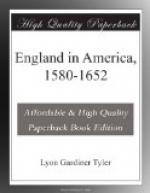In the mean time, a terrible fate overtook the friend and ally of Gorton, Miantonomoh, at the hands of his neighbors in the west, the Mohegans, whose chief, Uncas, attacked one of Miantonomoh’s subordinate chiefs; Miantonomoh accepted the war, was defeated, and captured by Uncas. Gorton interfered by letter to save his friend, and Uncas referred the question of Miantonomoh’s fate to the federal commissioners at Boston. The elders were clamorous for the death penalty, but the commissioners admitting that “there was no sufficient ground for us to put him to death,” agreed to deliver the unhappy chieftain to Uncas, with permission to kill him as soon as he came within Uncas’s jurisdiction. Accordingly, Miantonomoh was slaughtered by his enemy, who cut out a warm slice from his shoulder and declared it the sweetest morsel he had ever tasted and that it gave strength to his heart.[15] Thus fell Miantonomoh, the circumstances of whose death were “not at all creditable to the federal commissioners and their clerical advisers."[16]
Massachusetts sent out an armed force against the Gortonists, and after some resistance the leaders were captured and brought to Boston. Here Wilson and other ministers urged the death penalty upon the “blasphemous heretics.” But the civil authorities were not prepared to go so far, and in October, 1643, adopted the alternative of imprisonment. In March, 1644, Gorton and his friends were liberated, but banished on pain of death from all places claimed to be within the jurisdiction of Massachusetts.
They departed to Shawomet, but Governor Winthrop forbade them to stay there; and in April, 1644, Gorton and his friends once more sought refuge at Aquidneck.[17] Gorton, having contrived to reach England, returned in May, 1648, with an order from the Parliamentary commissioners for plantations, directed to the authorities of Massachusetts, Plymouth, and Connecticut, to permit him and his friends to reside in peace at Warwick, which they were then permitted to do.[18] In 1652 Gorton became president of Providence and Warwick.[19]
In December, 1643, the agents of Massachusetts in England obtained from the Parliamentary commissioners for plantations a grant of all the main-land in Massachusetts Bay; and it appeared for the moment as if it were all over with the independence of the Rhode Island towns. Fortunately, Williams was in England at the time, and with indomitable energy he set to work to counteract the danger.
In less than three months he persuaded the same commissioners to issue, March 14, 1644, a second instrument[20] incorporating the towns of “Providence Plantations, in the Narragansett Bay in New England,” and (in flat contradiction of the earlier grant to Massachusetts) giving them “the Tract of Land in the Continent of America called by the name of Narragansett Bay, bordering Northward and Northeast on the patent of the Massachusetts, East and Southeast on Plymouth Patent,




